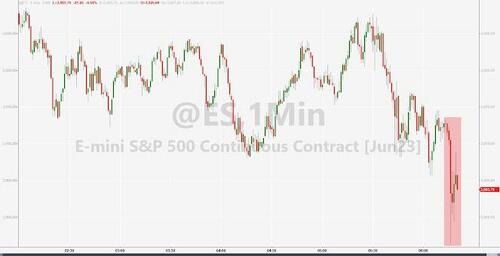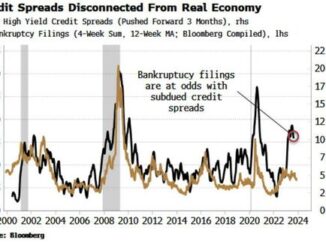
Update: Here is a live feed of Christine Lagarde who now faces the unenvious task of explaining why she hiked 50bps at a time when Credit Suisse is on the verge of collapse and every incremental rate hike by the ECB makes keeping deposits at the bank that much more difficult
Earlier:
With BBG publishing an unexpected CYA trial balloon just 30 minutes before the ECB announcement, according to which ECB Vice President Luis de Guindos told finance ministers on Tuesday that “some European Union banks could be vulnerable to rising interest rates“, and which sent expectations of a 50bps rate hike to just 35% from 60% earlier, it would have provided the central bank with the needed cover to hike less than most had expected.
However, it was not meant to happen, and moments ago the European Central Bank hiked 50bps as it guided last time, in the process assuring that Europe’s banking crisis would get even worse before (if) it gets better.
Saying that “Inflation is projected to remain too high for too long”, the Governing Council today “decided to increase the three key ECB interest rates by 50 basis points, in line with its determination to ensure the timely return of inflation to the 2% medium-term target.” The ECB cited that “the elevated level of uncertainty reinforces the importance of a data-dependent approach to the Governing Council’s policy rate decisions, which will be determined by its assessment of the inflation outlook in light of the incoming economic and financial data, the dynamics of underlying inflation, and the strength of monetary policy transmission.”
That said, the ECB was quick to note that “the Governing Council is monitoring current market tensions closely and stands ready to respond as necessary to preserve price stability and financial stability in the euro area.”
It also said that “the euro area banking sector is resilient, with strong capital and liquidity positions” and added that “the ECB’s policy toolkit is fully equipped to provide liquidity support to the euro area financial system if needed and to preserve the smooth transmission of monetary policy.”
Looking ahead, the ECB shared the following forecasts:
HICP Inflation Forecast:
2023: 5.3% (prev. 6.3%)2024: 2.9% (prev. 3.4%)2025: 2.1% (prev. 2.3%)
GDP Growth projections:
2023: 1.0% (prev. 0.5%)2024: 1.6% (prev 1.9%)2025: 1.6% (prev. 1.8%)
But noted that that…
new macroeconomic projections were finalised in early March, before the recent emergence of financial market tensions.These market tensions imply additional uncertainty around the baseline assessments of inflation and growth.Prior to these latest developments, the baseline path for headline inflation had already been revised down, mainly owing to a smaller contribution from energy prices than previously expected.
But perhaps most importantly, the ECB refrained from providing any guidance and refrained from signaling any future rate hikes in the statement, something it had done previously.
As the dust settles, we have seen a dovish reaction with EGBs lifting to fresh session highs and the EUR coming under pressure…
… with the dovish move perhaps a function of the lack of forward guidance, with the statement seemingly not presenting any bias for further policy tightening: likely to provide policymakers with maximum flexibility in light of recent market uncertainties. Alternatively, the market is expecting more easing from the ECB now that the banking crisis is expected to get worse due to tighter financial conditions. Sure enough, the Stoxx 600 Banks index extended a drop to 1% after the ECB decision, and spoos promptly droppedto session lows and were last trading below 3900.
Here is the full ECB press release:
Inflation is projected to remain too high for too long. Therefore, the Governing Council today decided to increase the three key ECB interest rates by 50 basis points, in line with its determination to ensure the timely return of inflation to the 2% medium-term target. The elevated level of uncertainty reinforces the importance of a data-dependent approach to the Governing Council’s policy rate decisions, which will be determined by its assessment of the inflation outlook in light of the incoming economic and financial data, the dynamics of underlying inflation, and the strength of monetary policy transmission.
The Governing Council is monitoring current market tensions closely and stands ready to respond as necessary to preserve price stability and financial stability in the euro area. The euro area banking sector is resilient, with strong capital and liquidity positions. In any case, the ECB’s policy toolkit is fully equipped to provide liquidity support to the euro area financial system if needed and to preserve the smooth transmission of monetary policy.
The new ECB staff macroeconomic projections were finalised in early March before the recent emergence of financial market tensions. As such, these tensions imply additional uncertainty around the baseline assessments of inflation and growth. Prior to these latest developments, the baseline path for headline inflation had already been revised down, mainly owing to a smaller contribution from energy prices than previously expected. ECB staff now see inflation averaging 5.3% in 2023, 2.9% in 2024 and 2.1% in 2025. At the same time, underlying price pressures remain strong. Inflation excluding energy and food continued to increase in February and ECB staff expect it to average 4.6% in 2023, which is higher than foreseen in the December projections. Subsequently, it is projected to come down to 2.5% in 2024 and 2.2% in 2025, as the upward pressures from past supply shocks and the reopening of the economy fade out and as tighter monetary policy increasingly dampens demand.
The baseline projections for growth in 2023 have been revised up to an average of 1.0% as a result of both the decline in energy prices and the economy’s greater resilience to the challenging international environment. ECB staff then expect growth to pick up further, to 1.6%, in both 2024 and 2025, underpinned by a robust labour market, improving confidence and a recovery in real incomes. At the same time, the pick-up in growth in 2024 and 2025 is weaker than projected in December, owing to the tightening of monetary policy.
Key ECB interest rates
The Governing Council decided to raise the three key ECB interest rates by 50 basis points. Accordingly, the interest rate on the main refinancing operations and the interest rates on the marginal lending facility and the deposit facility will be increased to 3.50%, 3.75% and 3.00% respectively, with effect from 22 March 2023.
Asset purchase programme (APP) and pandemic emergency purchase programme (PEPP)The APP portfolio is declining at a measured and predictable pace, as the Eurosystem does not reinvest all of the principal payments from maturing securities. The decline will amount to EUR15 billion per month on average until the end of June 2023 and its subsequent pace will be determined over time.
As concerns the PEPP, the Governing Council intends to reinvest the principal payments from maturing securities purchased under the programme until at least the end of 2024. In any case, the future roll-off of the PEPP portfolio will be managed to avoid interference with the appropriate monetary policy stance.
The Governing Council will continue applying flexibility in reinvesting redemptions coming due in the PEPP portfolio, with a view to countering risks to the monetary policy transmission mechanism related to the pandemic.
Refinancing operations
As banks are repaying the amounts borrowed under the targeted longer-term refinancing operations, the Governing Council will regularly assess how targeted lending operations are contributing to its monetary policy stance.
***
The Governing Council stands ready to adjust all of its instruments within its mandate to ensure that inflation returns to its 2% target over the medium term and to preserve the smooth functioning of monetary policy transmission. The ECB’s policy toolkit is fully equipped to provide liquidity support to the euro area financial system if needed. Moreover, the Transmission Protection Instrument is available to counter unwarranted, disorderly market dynamics that pose a serious threat to the transmission of monetary policy across all euro area countries, thus allowing the Governing Council to more effectively deliver on its price stability mandate.
The President of the ECB will comment on the considerations underlying these decisions at a press conference starting at 14:45 CET today.
Loading…



